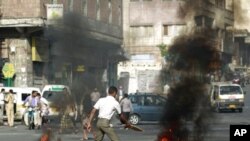Yemeni opposition activists staged more rallies demanding the ouster of President Ali Abdullah Saleh on Tuesday, as Gulf leaders met in Saudi Arabia to discuss Yemen's political stalemate.
Activists chanted anti-Saleh slogans in the Yemeni capital, Sana'a, and burned tires on a road in the country's third largest city, Taiz.
A day earlier, Yemeni security forces fired tear gas and live rounds at anti-government demonstrators blocking a road in Taiz, killing at least three people and wounding dozens more.
Leaders of the six-nation Gulf Cooperation Council gathered in the Saudi capital, Riyadh, Tuesday to discuss regional issues. The political crisis in Yemen between President Saleh and the opposition is on its agenda after a recent GCC plan to end the stalemate fell apart.
|
Abdul Wahab Alkebsi, director of the Africa and Middle East Division at the Center for International Private Enterprise, speaks to VOA’s Mohammed Elshinnawi about some of the challenges faced by Yemen and other Arab revolution countries :
|
The group that includes Bahrain, Kuwait, Oman, Qatar, Saudi Arabia and the United Arab Emirates had proposed a plan for Saleh to step down within 30 days and hand over power to a deputy in return for legal immunity. The plan also called for the establishment of a unity government including the opposition.
But Saleh has refused to sign the deal in his capacity as president as the GCC requires, saying the he will sign only as leader of the ruling General People's Congress Party. Saleh told supporters on Friday that he will resist calls to resign until a solution comes forward that meets constitutional standards.
GCC envoys are attempting to intervene and mediate in the deadlock.
Yemeni opposition activists angered by corruption and poverty have been staging daily protests since January to demand an end to Mr. Saleh's 33 years in power.
Some information for this report was provided by AFP and Reuters.




